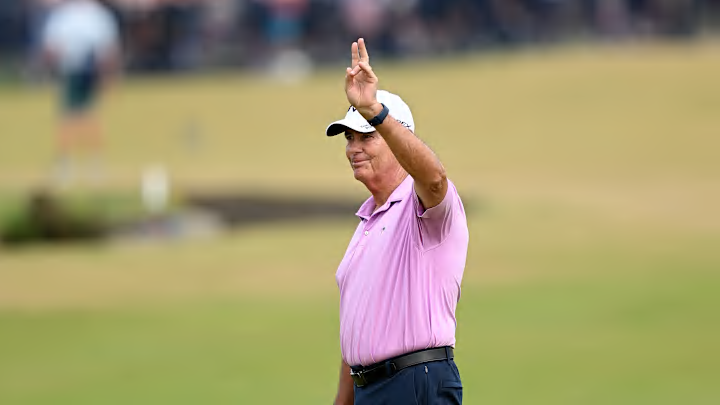Ian Baker-Finch started playing golf on what could barely be described as golf courses because they were so rough. He played in tournaments that awarded almost no prize money, just trying to get better and win.
Baker-Finch and his fellow wanna-be-highly-ranked pros traveled Queensland and other parts of Australia in a minibus caravan of golfers who were happy if any of them won enough to buy meals and a few beers for the rest. But that wasn’t hell. Hell came later.
The full crew, according to a 1980 photograph in Geoff Saunders' new biography about Baker-Finch, titled "To Hell and Back," included John Downs, Wayne Grady, Barty Hamers, Jeff Woodland, Gerry Taylor, Richard Parkin, Keith Ewald, Paul Foley, Bob Hunt, and of course, Baker-Finch himself.
Of that bunch, two names are probably recognizable to most golf fans because they went on to major championship success: Baker-Finch, who won the 1991 British Open, and Wayne Grady, who won the 1990 PGA Championship.
“It was really my goal in life early on, was to be a golf professional, and I achieved that,” Baker-Finch explained to me in an interview about his start. “I just wanted to be a club professional that could play occasionally and maybe even one day play in a British Open because that's what my great mentor and idol Peter Thomson had done.”
Thomson, of course, won the British Open five times, which puts him in a tie with Tom Watson, John Henry Taylor, and James Braid for the second-most all-time, one behind Harry Vardon.
By 1984, Baker-Finch earned his way into the British Open at St. Andrews. His practice rounds included playing with Thomson, Graeme Marsh (MBE for his services to golf), and Kel Nagle, the man who defeated Arnold Palmer at the British Open in 1960 when Palmer was trying to win the modern Grand Slam in a single year.
Thomson told Baker-Finch to play to the left off the tee on every hole at The Old Course because that would keep him out of most of the trouble. Baker-Finch followed that directive, and after trailing by just one stroke after the opening round, he led or was tied for the lead after the second and third rounds.
But he just couldn’t get it to the barn. Seve Ballesteros broke his heart that Sunday, as well as Tom Watson’s. Watson was going for his sixth British Open title and had a great chance until his second shot at the 17th, the infamous Road Hole, landed a foot from the stone wall behind the 17th green.
Baker-Finch returned to Australia after that season in Europe encouraged by his play.
“That really made me realize that, hey, I can do this. Maybe I should be playing internationally,” he said. "It was the start of my then refigured and rejuvenated goal of winning The Open Championship. And I was always goal-oriented, and I wrote my goals down, and for every goal, you've got 10 steps, and for every step, you’ve got 10 steps to that step.”
Eventually, he achieved it. In 1991, he won the British Open at Royal Birkdale, an amazing triumph for a young man who had come from a very modest background. For Baker-Finch, it was the aftermath, the success, that was hard.
“What everybody wants to know is what happened to me when I was playing so well, and then four years later, I couldn't break an egg,” Baker-Finch recalled. “I struggled and couldn't get off the struggle bus and decided to do television while I was getting some injuries to heal at the end of ’96.”
Baker-Finch made a few decisions that have also derailed other champions. He made equipment changes, and he tried to get more distance. Those two things have ruined more good golfers than anyone can imagine.
There should be a rule for golfers that when they win a big tournament, they can’t do anything different with their swing, clubs, or ball for six months. Even a year. A lot of careers would have been saved by that.
And he also thought he needed to improve. Improve what? He just won the British Open.
“That was the sliding door moment, basically, was having a bad Open Championship in 1997 and moving into TV,” explained. “So, 'To Hell and Back' really was more that I went through hell for a couple of years, I guess, trying to figure it all out.”
Baker-Finch’s last competitive round was in the 1997 British Open, where he shot a 92 over his first 18 holes and withdrew. At the time, he had several injuries and said in the book that he shouldn’t have played that event because the tournament really finished him.
When he returned to the British Open in 1998, it was in the booth, not as a player, and it has been onward and upward since. The following season, he had a contract with ABC for 16 events per season. And after nine seasons there, in 2007, he began a career with CBS Sports covering golf, a career that ended Sunday with the final round of the Wyndham Championship.
As far as the biography is concerned, he’s only unhappy about the title.
“If it had been my choice, it would have been 'To Heaven And Back,'” he said.
There’s more, much more in "To Hell and Back." If you enjoy golf and want to really understand the struggle some players endure, you’ll find this one a fascinating inside look at some of the typically untold stories of professional golf.
